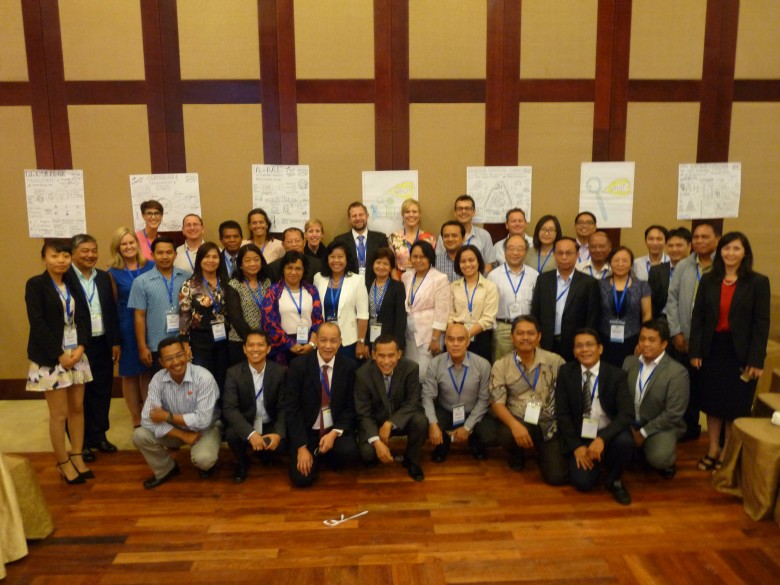
Speakers, panellists and attendees at the Application of Knowledge Management in Scaling up Partnership Investments in a Blue Economy workshop co-convened by CCRES at PEMSEA's #EASCongress2015 at Da Nang, Viet Nam. (Photo: M. Paterson)
CCRES co-convenes EAS2015 workshop
November 30 2015
“Solving the most pressing challenges of our time requires that we capture the imagination, passion and knowledge of the many, rather than a select few.”
Dr Sara Farley, Chief Operating Officer, Global Knowledge Institute.
How do we:
- Capture and share the imagination, passion and knowledge of the many?
- Create the knowledge partnerships and pathways needed to achieve this?
- Harness knowledge in taking small steps towards effective management?
- Think smarter when sharing and utilising our collective technical resources?
These are questions we sought to answer during the Application of Knowledge Management in Scaling Up Public and Private Sector Investments in a Blue Economy workshop convened by CCRES and the World Bank at PEMSEA’s East Asian Seas Congress at Da Nang, Viet Nam.
Together, representatives from government, donor agencies, regional projects, research institutes, NGOs and the private sector grappled with how to optimise use of the many tools, platforms, networks and relationships which make up knowledge management partnerships and pathways.
“Capturing, developing, sharing, and effectively using good practices, experiences and knowledge to achieve sustainable development objectives and targets is a challenge for many,” said Melanie King, Senior Advisor, CCRES, who chaired the workshop.
“However, while it is recognised that we need to form knowledge partnerships and pathways to meet these challenges, many people struggle with the ‘who’ and ‘how’ of doing so.
“To achieve this, we need consistent approaches which recognise the breadth and complexity of capturing knowledge and sharing it. We need to include the right people and make the case for their involvement. We need to clearly understand the problems or challenges we are attempting to solve.
“But, above all, we need to collaborate and optimise our networks, tools and information and include people in the process - and more importantly, we need to recognise that it takes time to involve people and achieve results.”
Knowledge management should enhance the capacity and performance of development projects and impact investments for sustainable development, Ms King says.
The workshop reached several conclusions which will be published in a guide to best practice in knowledge management for coastal management. These include:
- It is all about people and capacity building
- You need to understand the problem or challenge before you can move forward
- Need to make the case for involvement on complex challenges – focus on issues, challenges or problems – what do people relate to?
- Highly dependent on ‘buy-in’ or political will of influential or key people i.e the right message to the right people at the right time
- Tools: the best way to share and experience is by including your audience in the development and implementation
- Mechanisms for sharing: are many but how do we optimise and better utilise the networks, tools, information
- It takes time and timeframes need to be adjusted
CCRES Chief Scientist Professor Peter Mumby from The University of Queensland was keynote speaker for a session about the valuation of coastal ecosystem services, Team Leader, Business Development, Professor Mark Milstein, Cornell University, featured on a panel that discussed investing in the blue economy and Dr Russell Richards from the School of Agriculture and Food Sciences at The University of Queensland, presented during the knowledge management workshop.
For more details, contact:
Mark Paterson
Team Leader, Communications & Engagement
CCRES
c/ Currie Communications
Mobile: +61 (0) 409 411 110
mark@curriecommunications.com.au



